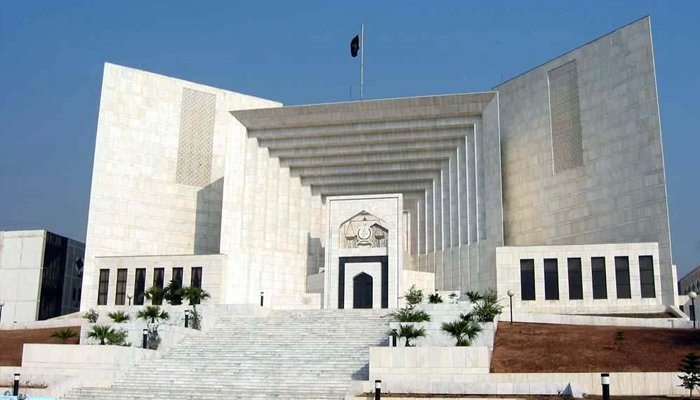Senate elections by open ballot: SC issues notices to all advocate generals
Five-member larger bench headed by Chief Justice of Pakistan Gulzar Ahmed hears presidential reference on Senate polls
ISLAMABAD: The Supreme Court took up the presidential reference filed on Senate elections on Monday.
The apex court issued notices to the federal and provincial advocate generals, the NA speaker and speakers of the provincial assemblies and the Election Commission of Pakistan in a hearing on the presidential reference for holding the Senate elections by open ballot.
A five-member larger bench of the apex court, headed by Chief Justice Gulzar Ahmed, and comprising Justice Mushir Alam, Justice Umar Ata Bandial, Justice Ijazul Ahsan and Justice Yahya Afridi, heard the reference.
The hearing was adjourned till January 11.
What was the presidential reference?
On Dec 23, the federal government had sought the Supreme Court opinion on holding the upcoming elections for the upper house of the Parliament through open ballot and show of hands.
President Dr Arif Alvi, after approving the proposal of the prime minister, had filed a reference in the Supreme Court, seeking its opinion on the Senate election through show of hands.
Through the reference, filed under Article 186 of the Constitution, the president sought the opinion of the country’s highest court on amending Section (6) 122 of the Election Act 2017 without amending the Constitution. “The requirement of secret ballot for election for Senate is not by way of a constitutional mandate but it is by only way of a statutory provisions namely Section 122(6) of the Elections Act, 2017, which may be amended by an Act of Parliament or through an ordinance, promulgated under Article 89 of the Constitution,” the reference had contended. The reference had claimed that it will promote transparency and accountability in the electoral process, acknowledge respect for the choice and desires of the citizen voters, strengthen political parties and their discipline which is essential for parliamentary democracy, discourage floor crossing, use of laundered money for vote buying in elections which grossly insult the mandate of the people.
It had submitted that the hands of the legislature could not be tied by way of implication or assumption of a constitutional prohibition where none exists specifically.
“This is all the more so when the matter does not impinge upon fundamental or vested right of the citizens, says the reference, adding that secrecy or openness of ballot is only relatable to the machinery provisions of a statute, the reference had stated.
It had further submitted that the legislature, in its wisdom, may equally provide for open ballot for election to the Senate by substituting the word ‘secret’ with ‘open’ in Section 122(6) of the Election Act, 2017.
The president had submitted that the interpretation of the Constitution and the laws is the exclusive domain of the judiciary with the Supreme Court as the final court.
The reference had contended that the instant question of law of public importance has arisen in the context of the malaise of vote buying that has damaged the purity of elections.
“Every Senate election since 1985 has generated debate, followed by commitment for reform and promise for open ballot, it added.
The reference had further contended that there is a national consensus amongst all major political parties, jurists, academia, journalists and civil society that the electoral process should be cleansed of the pervasive practice of vote buying in elections to the Senate.
“Even if Article 226 of the Constitution of Pakistan was amenable to two possible interpretations, this court has always adopted the interpretation which advances greater public welfare and good,” the reference said
It contended that through acceptance of the interpretation of Article 226 as advanced here, the larger national objectives could be achieved through equally legitimate constitutional methodology of interpretation of the Constitution entrusted to the august court.
-
Security forces gun down 30 terrorists in multiple IBOs in KP: ISPR
-
MQM-P calls for new province in Sindh
-
US report validates Pakistan military edge over India: PM
-
Banned TTP poses serious threat to Pakistan security: UNSC panel
-
CM Afridi clarifies remarks on by-poll after ECP requests army deployment
-
Dubai sees 3.2m Pakistani passengers in 2025 as airport sets new milestone
-
Security forces kill 23 Indian proxy terrorists in KP's Kurram
-
Pakistan to construct island to boost oil exploration: report












